Iran's Revolutionary Guards Seize Vessels For Fuel Smuggling
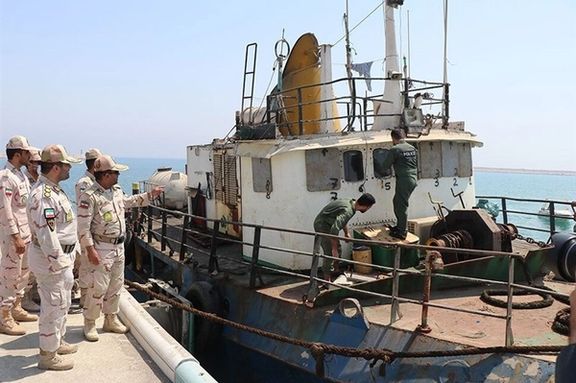
Iran's Revolutionary Guards' media say IRGC Navy has intercepted and seized ships smuggling more than 4.5 million liters of fuel.

Iran's Revolutionary Guards' media say IRGC Navy has intercepted and seized ships smuggling more than 4.5 million liters of fuel.
The operation resulted in the detention of 34 foreign crew members.
The vessels are said to be small local ships rather than conventional international tankers.
The nationalities of the foreign sailors and the countries to which the vessels belong were not disclosed.
The total of smuggled fuel seized is under 30,000 barrels and a relatively small amount by oil trading standards.
Iran has some of the lowest fuel prices in the world due to extensive subsidies and the devaluation of the rial. The regime is combating widespread fuel smuggling, both through land routes to neighboring countries and maritime channels to Gulf Arab states.
Commander Ali Ozmaee of the Fifth Naval Region of the Revolutionary Guard provided details of the seizure, saying that one vessel, carrying 2,280,000 liters of fuel and crewed by 13 foreigners, was apprehended south of Abu Musa Island. A second ship, with 21 foreign crew members and transporting 2,300,000 liters of fuel, was also seized by Revolutionary Guard forces.
The incident follows a pattern of the Revolutionary Guard's involvement in intercepting foreign ships in the Persian Gulf. The United States had previously reported that Iran engaged in aggressive actions against over 20 ships in the region within the past two years.
In a separate incident on July 7 of this year, the Revolutionary Guard claimed the seizure of a vessel with 12 foreign crew members carrying 900 tons of smuggled fuel.

Amnesty International has released a report exposing the Iranian government's use of rape and sexual violence as tools of repression in last year’s protests.
The 120-page report titled “They violently raped me: Sexual violence weaponized to crush Iran’s Woman, Life, Freedom uprising,” refers to the popular revolt against the Islamic Republic sparked by the death of 22-year-old Mahsa Amini at the hands of the so-called morality police. The recurring nationwide protests that started in September 2022 lasted for months until the regime crushed the dissent by killing about 600, arresting over 22,000 and hanging some of protesters.
The new report published Wednesday documents in detail “the harrowing ordeals of 45 survivors, including 26 men, 12 women and seven children, who were subjected to rape, gang rape and/or other forms of sexual violence by intelligence and security forces following their arbitrary arrest for challenging decades of oppression and entrenched gender-based discrimination.”
Sixteen of the 45 survivors whose cases were documented in the report were raped, including six women, seven men, a 14-year-old girl, and two boys aged 16 and 17. Six of them – four women and two men – were gang raped by up to 10 male agents.
The victims faced sexual violence at the hands of various branches of the Iranian security apparatus, including the Revolutionary Guards, Basij paramilitary force, Intelligence Ministry, and different police branches in more than half of Iran's 31 provinces. The survivors' testimonies paint a disturbing picture of rape and sexual violence, with victims subjected to unimaginable brutality, including the use of wooden and metal batons, glass bottles, hosepipes, and even electric shocks.
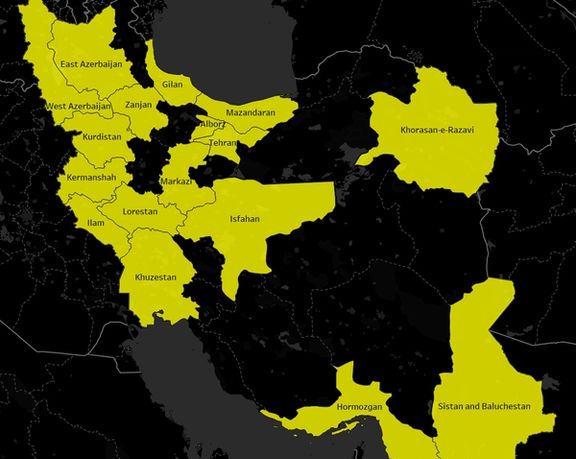
Criminology expert Moein Khazaeli said in an interview with Iran International that the report provides damning evidence that sexual violence is systematic in Iran. The perpetrators are either directly ordered by superiors to engage in such acts or their actions are intentionally ignored by the government, indicating that “sexual violence is used as tool for repression.”
Despite earlier reports of a pattern of widespread sexual violence as a means of torture and intimidation, the Iranian authorities have never charged or prosecuted anyone for such crimes. The report highlighted that the lack of accountability has left survivors grappling with physical and psychological trauma, many unable to seek justice domestically due to the fear of reprisals.
“I used to be a fighter in life. Even when the Islamic Republic tried to break me down, I carried on. However, recently, I think about suicide a lot," said Sahar, a Baluchi woman who recounted the traumatic impact of sexual violence at the hands of security forces, who removed her clothes and touched her breasts and genitals while mocking her body and skin color and threatening her with rape.
Human rights activist Reza Akvanian told Iran International the primary force that push numerous survivors to commit suicide after their release is the profound psychological trauma inflicted by the Islamic Republic’s forces.
Another woman, Zahra, told Amnesty International that, while in a van belonging to the Special Forces of Iran’s police (yegan-e vijeh), an agent pulled down her trousers in the presence of other female detainees and raped her. She added that she witnessed another agent ordering two handcuffed women in the van to perform oral sex acts on him and, when one woman refused, he dragged her out of the van by her hair.
Amnesty International's Secretary-General Agnés Callamard emphasized how survivors have been left without recourse, trapped in a cycle of institutionalized impunity, silencing, and enduring deep physical and psychological scars, pointing to “a wider pattern in the use of sexual violence as a key weapon in the Iranian authorities’ armory of repression of the protests and suppression of dissent to cling to power at all costs.”
“Iran’s prosecutors and judges were not only complicit by ignoring or covering up survivors’ complaints of rape, but also used torture-tainted ‘confessions’ to bring spurious charges against survivors and sentence them to imprisonment or death,” Callamard stated.
Amnesty International urged the global community to stand with the survivors and pursue justice, including through supporting the extension of the UN Fact-Finding mission on Iran to ensure an independent mechanism for collecting, preserving, and analyzing evidence of crimes under international law. The rights group also urged states to initiate criminal investigations against suspected perpetrators under the principle of universal jurisdiction, stressing the need for international arrest warrants.
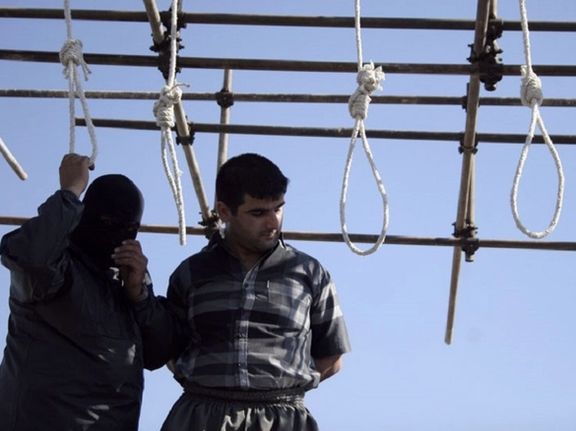
Four prisoners were executed at jails in Iran on Wednesday, as the Islamic Republic added to its toll of hundreds of lives taken in capital punishment this year.
Zabihollah Arjmand, 35, was hanged in Dehdasht Central Prison, according to US-based Human Rights Activists News Agency (HRANA).
He had been arrested in 2019 on charges of drug trafficking and subsequently sentenced to death.
Two Kurdish prisoners, Khaled Rouhi and Sirous Heydari, were executed in Sanandaj Central Prison, on charges of murder.
Human Rights Organization Hangaw reported that Heydari had been sentenced to death 12 years ago, while Khaled Rouhi had been condemned to death four years ago.
A prisoner in Saqqez Central Prison was also executed, having been sentenced to death on rape charges.
United Nations Secretary-General Antonio Guterres reported to the General Assembly in October on human rights violations in Iran. He warned that at least 419 executions had been carried out in the first seven months of the year alone in Iran, a shocking rise of 30 per cent over the same period in 2022. More than half of those sentenced to death had been found guilty of charges related to drug crimes.
The Iran Human Rights Organization reported on Thursday that the number of executions carried out by the Islamic Republic since the beginning of this year has reached 707 individuals, marking an unprecedented increase over the past eight years.
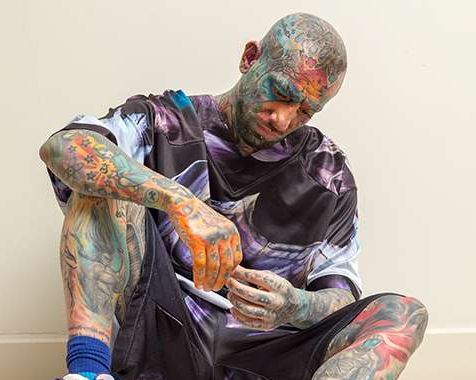
Iranian singer Tataloo has been sent to the Islamic Republic by the Turkish authorities to face judicial charges.
The rapper whose real name is Amir-Hossein Maqsoudlou was handed over at the Bazargan border on Wednesday after being detained in Turkey, according to Mizan News Agency, affiliated with the Iranian judiciary.
He is said to have been "immediately detained on judicial orders" after a number of private complaints.
These include allegations against him from individuals under 18 and their families, accusing him of sexual assault and acts of violence.
Iran's hardliners frequently express disapproval towards artists and public figures, leading to the summons of numerous individuals on various charges including alleged violations of modesty.
Earlier, Behnam Babazadeh, a music journalist based in Iran, had reported Tataloo's detention by Turkish police following a complaint from the Consulate of the Islamic Republic in Istanbul.
Babazadeh stated that Tataloo was accused of insulting the staff of the consulate.
Four years ago, Tataloo was detained by the Turkish authorities at the request of the law enforcement forces of the Islamic Republic but released after a week. At that time, Iranian media accused him of insulting Shiite religious figures during one of his concerts.
Born in 1987 in Tehran, Tataloo rose to prominence when he started posting works on his blog in 2004. At times, he has endorsed religious values such as hijab and praised the Supreme Leader of the Islamic Republic, Ali Khamenei . He supported Ebrahim Raisi in the presidential elections of 2017.
Tataloo's alignment with regime policy was such that Khamenei commended one of his songs titled "Nuclear Energy” – which proclaimed Iran’s right to defend itself – as having a "good melody" and "good content", adding with satisfaction that it had upset the "enemy."

The FBI Director has warned that threats from entities like Iran cannot be effectively countered if Congress fails to renew a spying authority set to expire on December 31.
In a Senate hearing Tuesday, Christopher Wray warned that Section 702 of Foreign Intelligence Surveillance Act (FISA) is key to US national security and its ability to combat foreign terror.
“When it comes to foreign adversaries like Iran, whose actions across a whole host of threats have grown more brazen… or the People’s Republic of China, which poses a generational threat to our economic and national security, stripping the FBI of its 702 authorities would be a form of unilateral disarmament,” Wray said.
Section 702 of FISA allows intelligence agencies to monitor non-Americans outside the US and collect and analyze their communications, such as emails and text messages.
Calls for changes to Section 702 have emerged in Congress following revelations that the FBI improperly searched the database for exchanges with US citizens, including political protesters, campaign donors, and even members of Congress.
Critics argue that FISA 702 has become a backdoor to investigate Americans without warrants. However, the US government and the intelligence community contend that recent reforms prevent such abuse, and additional red tape would neutralize the tool in the face of foreign threats.
"In the last couple of years Iran has tried to assassinate a former US national security advisor on US soil,” Wray reminded the Senate Judiciary Committee.”[Iran] has tried to kidnap and kill an American journalist in NYC… and for extra credit, has tried to interfere in the last presidential elections. " He was referring to plots to kill former Secretary of State Mike Pompeo as retaliation for the targeted killing of IRGC militant mastermind Qasem Soleimani in Baghdad, in January 2020.
US officials say Section 702 has been critical to stopping weapons sales to Iran before, and “in 2022 to help the administration target an individual and foreign firm that attempted to circumvent US sanctions on Iran,” according to Politico.
Intelligence agencies had identified what the Iranian regime needed for its advanced weapons program, and then searched for those (including names of components and manufacturers) in the 702 database.
In his Senate hearing Tuesday, the FBI director warned again that “allowing 702 to lapse, or amending it in a way that undermines its effectiveness would be akin to laying bricks to rebuild another, pre-9/11-style wall.”
Opponents of the 702 say it invades Americans’ privacy, undermines trust, and oversteps constitutional boundaries. Some US lawmakers are proposing changes that would require a warrant to utilize the database for investigating US citizens.
Senator Mike Lee, one of the more vocal critics of Section 702, grilled Wray on potential abuses of the tool.
“When the FBI is allowed to police itself, and need not go to court to get a warrant based on evidence establishing probable cause—like every other law-enforcement agency in America—it abuses its power under FISA,” he later posted on X.
“When Wray insists that a warrant requirement would just be too difficult for FBI to comply with, that isn’t surprising,” Senator Lee said. “It's supposed to be hard for the government to spy on Americans. That's why we have a Constitution.”
It is expected that the Judiciary Committee proposal and a House Intelligence plan are introduced as amendments Wednesday, “moving forward only with the proposal that gathers the most votes,” according to Politico.
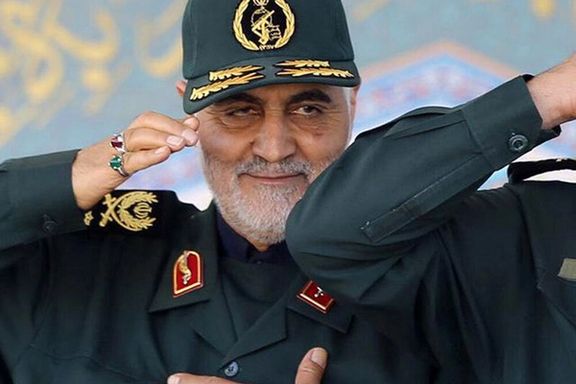
An Iranian court looking into the killing of IRGC's Quds commander Qassem Soleimani has awarded damages of almost $50bn against the US government and linked individuals and bodies.
Judicial officials also demanded an apology for the killing of the Soleimani in a drone strike near Baghdad International Airport in January 2020.
Then US president Donald Trump justified the action by saying that Soleimani was actively planning attacks on American diplomats and service members in the region. Trump also claimed the veteran regime commander was already "directly and indirectly responsible for the deaths of millions of people”.
Now the 55th Branch of the Legal Court of International Relations of the Tehran Justice Department has ruled against the US government and 41 other individuals and entities, ordering them to pay a sum of $49.77 billion in connection with the killing.
The court also ordered that the US government and the others held responsible for Soleimani’s death should issue a formal apology, with instructions to publish it in a widely circulated newspaper.
The sentence comes after judicial officials had ruled in favor of more than 3,000 plaintiffs who had filed complaints claiming that they had suffered damages as a result of Soleimani’s death.
Iranian Foreign Minister Hossein Amir-Abdollahian previously stated in January that nearly 60 US officials had been blacklisted by Tehran for their involvement in the assassination of Soleimani.
Both Iran’s President Ebrahim Raisi and Supreme Leader Ali Khamenei have repeatedly vowed revenge for the killing of Soleimani.
Since Soleimani’s death, a member of the Iranian Revolutionary Guard has been charged with planning to assassinate John Bolton, the former US National Security Advisor, as retaliation for the military commander’s killing. Former Secretary of State Mike Pompeo was also identified as a potential target in the same plot.
Qassem Soleimani played a crucial role in Iran's external military and intelligence operations, overseeing support and organization of militant proxy forces, including Lebanese Hezbollah and Iraqi Shiite militia groups engaged in hostilities against US forces in the region.